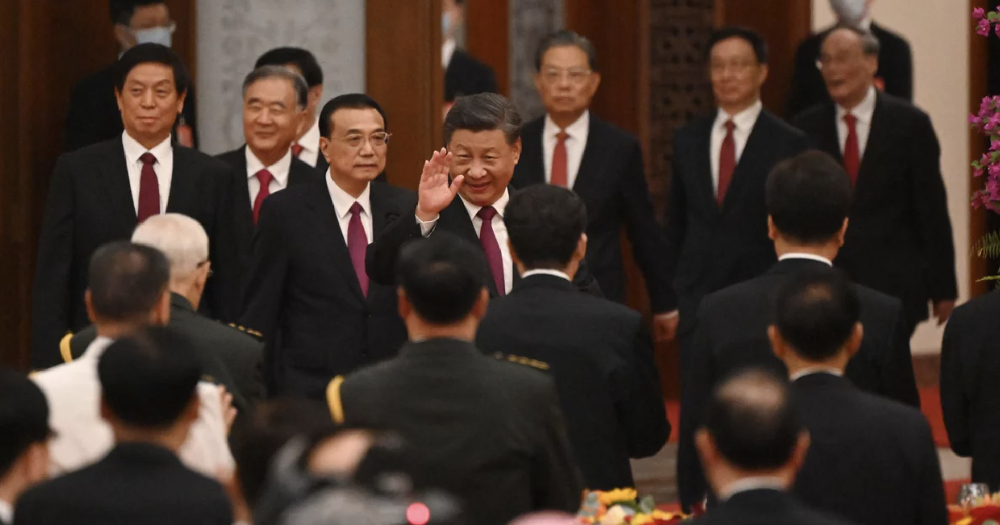Follow us on Telegram for the latest updates: https://t.me/mothershipsg
Today in Beijing, 2,296 delegates of the Chinese Communist Party (CCP) gathered at the Great Hall of the People to open the 20th Party Congress.
An unprecedented third term
China watchers have already been paying close attention to the lead up to the twice-in-a-decade congress which will officiate the Party's plans for the future. While decisions are presumed to have been made at a plenary session before the 20th Party Congress, speculations on certain policy decisions are yet to be confirmed.
Chinese President Xi Jinping is expected to be re-elected to serve an unprecedented third term as the general secretary of the CCP. The decisions will be a norm-breaking move since his immediate predecessors, Jiang Zemin and Hu Jintao, who served two terms. There are also speculations that Xi will be granted the title of "Chairman", a position once held by Mao Zedong and not used since 1982.
Xi rose to power in 2012 when he was first elected as general secretary. His first years in power were marked by a widespread “anti-corruption” crackdown that have been viewed as a method of purging political opponents and consolidating power. In September, Sun Lijun, former vice minister for public security, was given a "suspended" death sentence for corrupt practices.
Xi’s tenure also ushered in a weighty vision for the “great rejuvenation of the Chinese nation”, along with the idea of a “Common Prosperity” exemplified by Xi’s crackdown on the country’s large tech-companies.
The Party Congress will be tasked to elect the Central Committee who, on the day after the Congress, will approve the members of the Politburo and the Standing Committee, the highest decision-making body of the Party. A reshuffle of the country’s top leadership is to be expected as Premier Li Keqiang will be stepping down in March next year.
China to continue with zero-Covid
Those hopeful for an end to China’s “zero-Covid” strategy also found themselves disappointed.
As the congress kicks off in Beijing, Xi defended the strategy as an "all out people's war to stop the spread of the virus", the BBC reported.
Previously, Liang Wannian, one of the key architects of zero Covid, stated that “it’s not scientifically possible to clearly delineate” the gradual relaxation of restrictions.
People’s Daily, the Party’s mouthpiece, had also published a number of commentaries that strongly supported sticking with the current strategy. The restrictions have hindered growth in the Chinese economy with the country’s third-quarter GDP growth projected at 3.5 per cent. This is a much lower expectation compared to the years between 1992 and 2020 where each quarter recorded growth of more than 6 per cent.
Stable economic growth has been the cornerstone of the CCP’s legitimacy; aware of this, Xi has pushed for greater emphasis on Chinese nationalism and Communist ideology. In 2017, the 19th Party Congress incorporated “Xi Jinping Thought” into the Party’s constitution and a year later it was amended into the preamble of the constitution of the People’s Republic of China.
Rare protest in Beijing
But Xi and his policies have also gained disapproval at home.
A few days prior to the opening of the Party Congress, Beijing authorities were met with a rare sight of protest as banners with slogans critical of the CCP were hung from a bridge.
“We want to eat, not do coronavirus tests; reform, not the Cultural Revolution. We want freedom, not lockdowns; elections, not rulers.” one banner read. “Remove dictator and national traitor Xi Jinping” declared another. The alleged protester was taken away by the police and banners have been removed.
今天上午北京四通桥上有人挂出了条幅,在社交媒体疯传。 pic.twitter.com/cTUBePKMGF
— Jingzhou Tao 陶景洲 (@JingzhouTao) October 13, 2022
Standing firm on Taiwan
“Why did the Soviet Union disintegrate?” Xi once asked. He argued that the torchbearer of Marxism-Leninism had continuously challenged its own history that negated Lenin and Stalin, creating “historical nihilism and confused thinking.” The Party and State lost all their power leading to the disintegration of the socialist state. “This is a cautionary tale!” Xi warned.
Intensified tensions between Washington and Beijing, along with Russia’s invasion of Ukraine, have certainly not aided the Party’s aim to overcome its economic challenges. Now, it is pushed to reassess its foreign policy outlook.
And although Beijing exercised some restraint in its unprecedented response towardsU.S. House Speaker Nancy Pelosi’s August visit to Taiwan, Xi has not changed his position that self-governing island’s “reunification” with the mainland “must be fulfilled.”
Reiterating his position at the congress, Xi said Beijing would "never promise to renounce the use of force" and that "complete reunification of our country must and will be realised". Delegates then applauded. Xi also warned against "foreign interference" of the Taiwan issue.
Competition with the U.S.
In the first week of October, the Biden administration announced new limitations on the sale of semiconductor technology to China that could be used for military purposes. The White House has also recently published the Biden-Harris Administration’s National Security Strategy, a document that outlines the country’s foreign policy direction, which expressed Washington’s aim to “out-compete” China and “Constrain” Russia.
With U.S. led institutions like the Quad (the Quadrilateral Security Dialogue that includes Australia, India, Japan, and the U.S.) and AUKUS (a defense agreement between Australia, the UK and the U.S.) gaining strategic importance, China will also view them, according to former Australian Prime Minister Kevin Rudd, as “both strategically hostile and ideologically predictable”.
How Xi and his Party will confront these real and perceived challenges in a renewed manner at home and abroad will be worth observing as the Party Congress unfolds this week.
Top image by Noel Celis/AFP via Getty Images
If you like what you read, follow us on Facebook, Instagram, Twitter and Telegram to get the latest updates.
